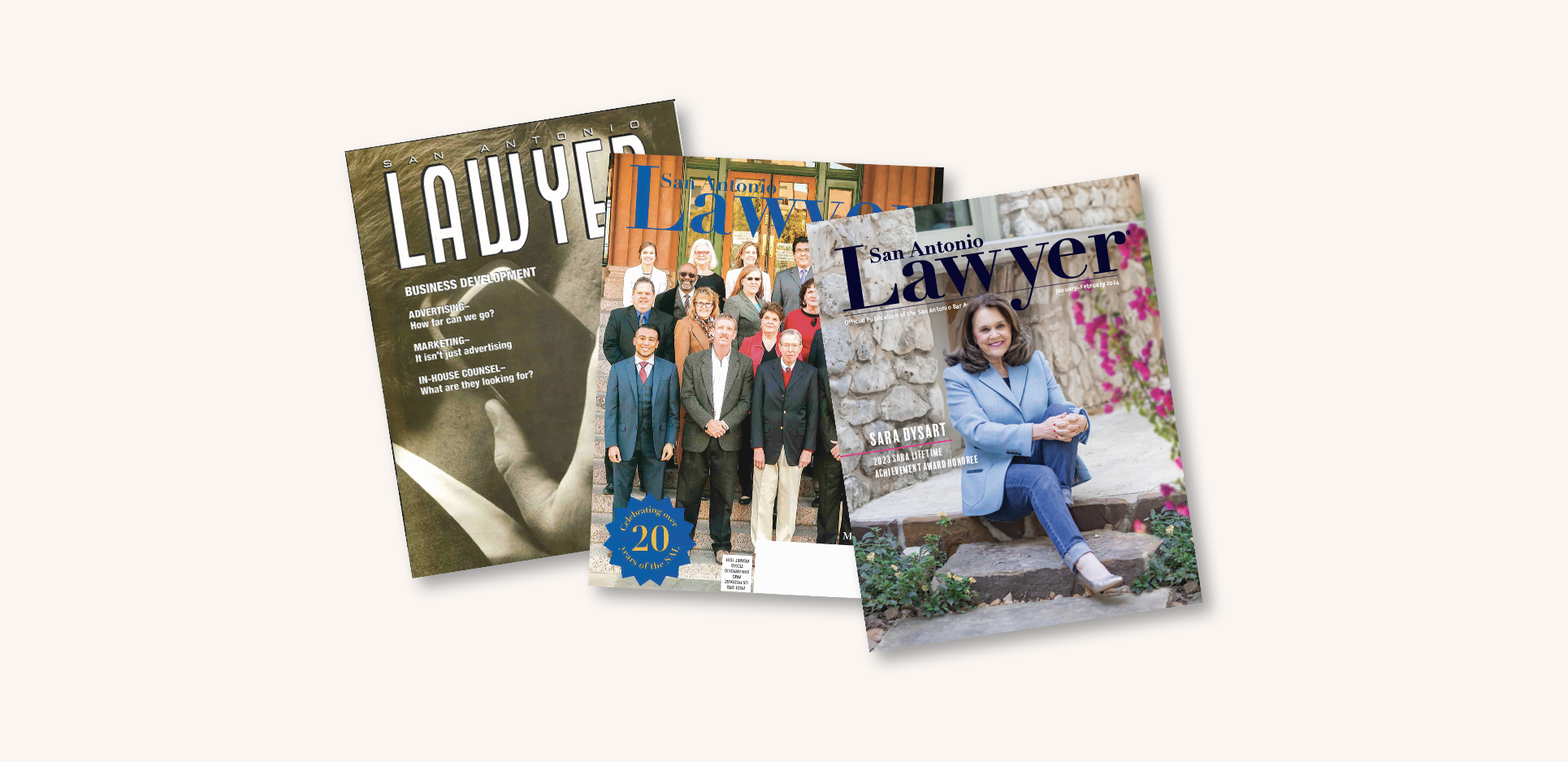
9 minute read
Western District of Texas Court Summaries
FEDERAL COURT UPDATE
By Soledad Valenciano, Melanie Fry, and Jeffrie Lewis
If you are aware of a Western District of Texas order that you believe would be of interest to the local bar and should be summarized in this column, please contact Soledad Valenciano (svalenciano@svtxlaw.com, 210-787-4654) or Melanie Fry (mfry@dykema.com, 210-554-5500) with the style and cause number of the case, and the entry date and docket number of the order.
Discovery; Local Rule CV-16(e)
Xiaorong Lan v. Univ. of Tex. at San Antonio, SA-22-CV-00769-FB (Chestney, E., Nov. 13, 2023)
The plaintiff moved to compel the defendant to supplement production despite the defendant’s having supplemented its response three times. The plaintiff also filed a motion to reopen discovery and requested leave to depose two witnesses. Local Rule CV-16(e) provides that absent exceptional circumstances, no motions relating to discovery shall be filed after the expiration of the discovery deadline, unless the motion is filed within 14 days after the discovery deadline and pertains to conduct occurring during the final 7 days of discovery. To compel another party to initiate an additional search for responsive documents, the requesting party must point to a material or specific deficiency in the production and make a showing, including through the documents produced, that allows the court to reasonably deduce that other documents may exist or did exist and have been destroyed. Alternatively, the requesting party must point to the existence of additional responsive material. Simply arguing that only a few documents were produced is insufficient. In this case, the plaintiff failed to address the factors related to good cause—an explanation for the failure to comply with the scheduling order, the importance of the modification to the scheduling order, the potential prejudice in allowing the modification, and the availability of a continuance to cure such prejudice. Therefore, the motion to compel production was denied. Because the plaintiff could have timely noticed the two depositions within the discovery period and because the plaintiff failed to show good cause to extend the discovery deadline, the court also denied the motions relating to the depositions. Finally, the defendant was protected from having to answer discovery served the day after discovery closed. Pursuant to Local Rule CV-16(e), written discovery is not timely unless the response would be due before the discovery deadline.
Toxic Torts; Causation; Summary Judgment
Odom v. BP Expl. & Prod., Inc ., et. al, SA: 17-CV-00202-OLG (Garcia, O., Nov. 21, 2023)
In this toxic tort case, the court adopted the report and recommendation of Magistrate Judge Henry J. Bemporad and granted the defendant’s first amended motion for summary judgment on the issue of general causation. The Fifth Circuit requires a “twostep process” for examining causation in toxic tort claims, requiring a plaintiff to show both general and specific causation. If the court finds no general causation evidence, there is no need to consider specific causation. Here, the plaintiff failed to present evidence on the issue of general causation—that a substance is capable of causing a particular injury or condition in the general population; or for Back-End Litigation Option matters—that exposure to a certain level of a certain substance for a certain period of time can cause a particular condition. Instead of providing such evidence, the plaintiff merely complained of the insufficiency of the monitoring data provided by the defendants. The court reminded the plaintiff that the causation expert could have consulted “the entire universe of relevant epidemiological evidence” to support an opinion on general causation and was not limited to sampling data provided by the defendants.
Trademark Infringement, Trade Dress Infringement, Motion to Dismiss
NS Brands, Ltd. v. Mastronardi Produce, Ltd., SA-23-CV-00445-JKP (Pulliam, J., Dec. 14, 2023)
In a trademark dispute between two grape tomato sellers regarding their respective product packaging, the court denied the defendant’s motion to dismiss the plaintiff’s claims of trademark infringement and trade dress infringement. The court found that the plaintiff plausibly alleged a claim for trademark infringement and trade dress infringement because it could show: (1) the trademark or trade dress it alleged is protectable; and (2) the alleged infringer’s use creates a likelihood of confusion considering the “8 digits of confusion.” As to trademark infringement, the parties agreed that the plaintiff’s trademark qualified for protection. Trade dress or “the total image and overall appearance of a product” must be inherently distinctive or have achieved secondary meaning in the public’s mind to be protected. Fair notice, vagueness, and overprotection are considerations in a trade dress analysis. The court found that the plaintiff’s three definitions of its trade dress, which included use of the term “base” and “lid” alternatively, while confusing, was still sufficiently specific to provide notice of what the plaintiff was trying to protect, i.e., a twoelement trade dress of a yellow opaque plastic lid with a clear transparent dome, and therefore met the element of qualifying for protection. As to both claims, the plaintiff provided evidence of all 8 digits of confusion, including confusion by retailers who frequently intermixed and mistook the two products for the other. Additionally, the defendant moved for dismissal on its affirmative defense of estoppel, claiming that the plaintiff’s defini- tion of trade dress was different from that defined in the parties’ 2021 settlement agreement, which was attached to the complaint. The court determined it would be improper to consider the settlement agreement at this stage of the litigation, as the document was not “central to the Plaintiff’s claims”—rather, it was central to the defendant’s claims. Moreover, the court found that a Rule 12(b)(6) motion was an improper vehicle to resolve an affirmative defense of estoppel.
Forum Non Conveniens; Forum Selection Clause; Motion to Dismiss; Venue
Holt Tex., Ltd. v. Vita Inclinata Techs., Inc., SA-23-CV-01130-JKP, (Pulliam, J., Nov. 20, 2023)
The court granted a motion to dismiss for forum non conveniens, enforcing a contractual forum selection clause wherein the parties agreed not to commence any litigation against the other “in any forum other than the United States District Court for the District of Delaware or the courts of the State of Colorado sitting in the County of Denver[.]”
After a dispute arose relating to an agreement between the parties under which the defendant became a distributor for the plaintiff’s products in specified territories, including Texas, the plaintiff terminated the agreement. The plaintiff filed a complaint in the United States District Court for the District of Colorado, invoking the agreement’s forum selection clause. The defendant then filed a motion to dismiss, arguing venue would be proper in Colorado state court or in Texas. Before the federal court in Colorado ruled, the plaintiff dismissed the lawsuit and refiled in Denver County, a Colorado state court. Before the Colorado defendant was formally served with the Colorado state court suit, it filed the instant action in Texas state court, which the Colorado plaintiff (now the defendant) removed based on diversity jurisdiction.
In response to the original plaintiff/subsequent defendant’s motion to dismiss, the court conducted a forum non conveniens analysis. The court rejected the original defendant/subsequent plaintiff’s arguments against dismissal, including that: (1) the original plaintiff/subsequent defendant breached the agreement and, therefore, the forum selection clause was ineffective; (2) the forum selection clause was actually a “venue selection clause” requiring a transfer pursuant to 28 U.S.C. 1404(a); and (3) the forum selec- tion clause violated Texas law, which voids any provision in a dealer agreement that applies non-Texas state law. Instead, the court held that the clear language in the contract setting the forum in “U.S. District Court for the District of Delaware or the courts of the State of Colorado sitting in the County of Denver” did not include the forum selected by the original defendant/subsequent plaintiff, and granted the original plaintiff/subsequent defendant’s motion to dismiss.
Expert Report; Deadlines; Insurance
Shweiki v. Allied Prop. & Cas. Ins. Co., No. SA-22-CV-758-OLG, (Garcia, O., Dec. 5, 2023)
The court granted in part a motion to strike an expert witness’s untimely revised opinion testimony. Months after the designated deadline, the expert revised his report to nearly double the amount of damages originally estimated. Although supplement expert reports are permissible when information is not available prior to the deadline or to correct inaccuracies, they are not allowable when the information was available to the expert prior to the deadline. Because the expert’s report was untimely, the revised opinions were stricken and the expert’s testimony was limited to the analysis and opinions contained in the first report.
S.B.1.; Civil Rights Act
La Unión del Pueblo Entero v. Abbott , 5:21-CV-0844-XR (Rodriguez, X., Nov. 29, 2023)
The court considered challenges to certain provisions of Texas’s Election Protection and Integrity Act of 2021 (“S.B.1”). The plaintiffs alleged that S.B.1’s requirement for identification number-matching for Texas’s mail-in voting process violates Section 101 of the Civil Rights Act (CRA) of 1964 (the “Materiality Provision”). The number matching requirement calls for a Texas Driver’s License, Texas Personal Identification Number, Election Identification Certificate Number issued by DOT, or the last 4 digits of one’s Social Security Number. Election officials confirmed that the numbers are not used to ensure that voters are qualified to vote or to cast a mail ballot, to identify voters, or to flag potential fraud. Such validation is completed by using other information on mail ballots such as the voter’s name, date of birth, and address. The court considered whether the number-matching provisions require election officials to disenfranchise voters for errors that are immaterial to their eligibility. The court concluded that Sections 5.07 and 5.13 of S.B.1, which require officials to reject mail ballot applications and mail ballots based on errors or omissions that are not material in determining whether voters are qualified under Texas law to vote or cast a mail ballot, deny the statutory right to vote protected by the Materiality Provision. Thus, Sections 5.07 and 5.13 of S.B.1 violate the CRA and a permanent injunction of those sections was warranted.











